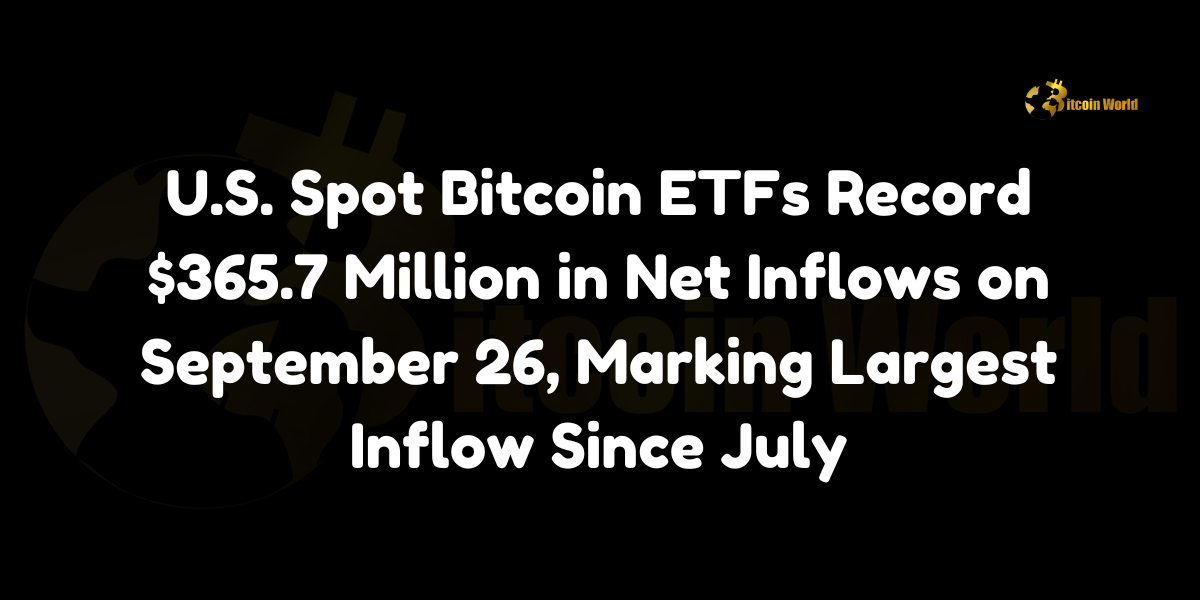USA Spot Bitcoin ETFs Record $365.7 Million in Net Inflows on September 26, Marking Largest Inflow Since July
The U.S. spot Bitcoin ETFs market witnessed a significant boost on September 26, recording a combined net inflow of $365.7 million, according to data from Farside Investors. This marks the highest single-day inflow since July 22, 2024, underscoring the growing demand for Bitcoin exchange-traded funds (ETFs) as investors continue to seek exposure to the leading cryptocurrency.
Several key Bitcoin ETFs contributed to this surge, with ARK Invest’s ARKB leading the pack, followed closely by BlackRock’s IBIT, Fidelity’s FBTC, and Bitwise’s BITB. Despite the overall inflows, Grayscale’s GBTC was the only ETF to report a net outflow, further highlighting the shifting dynamics within the crypto investment product space.
ARK Invest’s ARKB Leads with $113.8 Million in Net Inflows
ARK Invest’s ARKB recorded the largest net inflow of $113.8 million on September 26, continuing its trend as one of the most popular spot Bitcoin ETFs in the U.S. market. ARK Invest, led by CEO Cathie Wood, has long been a proponent of Bitcoin as a key asset in the future of digital finance, and the strong inflows into ARKB reflect investor confidence in both the fund and the broader Bitcoin market.
The robust inflows into ARKB also highlight the increasing appetite for regulated Bitcoin investment products among institutional and retail investors. As more investors look for exposure to Bitcoin without having to directly hold the asset, spot Bitcoin ETFs like ARKB offer a convenient and regulated way to participate in the market’s upside potential.
BlackRock’s IBIT and Fidelity’s FBTC See Strong Inflows
Following closely behind ARK Invest’s ARKB were BlackRock’s IBIT and Fidelity’s FBTC, which saw net inflows of $93.4 million and $74 million, respectively. These inflows further underscore the rising popularity of spot Bitcoin ETFs among traditional financial institutions and investors.
BlackRock, the world’s largest asset manager, has positioned itself as a major player in the crypto ETF space with the launch of its IBIT fund. The strong inflows into IBIT reflect growing confidence in BlackRock’s ability to offer a trusted and secure vehicle for investors to gain exposure to Bitcoin. BlackRock’s entry into the spot Bitcoin ETF market has been viewed as a turning point for broader institutional adoption of cryptocurrencies.
Similarly, Fidelity’s FBTC also saw significant inflows, further reinforcing Fidelity’s commitment to expanding its crypto investment products. As one of the earliest traditional financial institutions to embrace cryptocurrencies, Fidelity has consistently positioned itself as a leader in offering Bitcoin and other digital assets to its clients, and the net inflow of $74 million into FBTC underscores continued interest in regulated Bitcoin exposure.
Bitwise’s BITB Also Sees Substantial Gains
Another notable player in the spot Bitcoin ETF market on September 26 was Bitwise’s BITB, which saw $50.4 million in net inflows. Bitwise has been a long-time advocate for providing low-cost, accessible crypto investment products, and the substantial inflows into BITB signal growing demand for its offerings.
With a focus on providing innovative crypto index funds and ETFs, Bitwise continues to attract both institutional and retail investors seeking cost-effective ways to gain exposure to Bitcoin and other digital assets.
Grayscale’s GBTC Reports $7.7 Million in Net Outflows
Despite the overall positive trend in spot Bitcoin ETFs, Grayscale’s GBTC was the only fund to report a net outflow on September 26, amounting to $7.7 million. This marks a notable contrast to the other Bitcoin ETFs, which all recorded significant inflows.
The Grayscale Bitcoin Trust (GBTC) has long been a leading product for investors seeking Bitcoin exposure in the form of a trust, but it has faced increasing competition from the newer spot Bitcoin ETFs. The net outflow from GBTC suggests that some investors may be shifting their capital to these spot ETFs, which offer more liquidity and often lower fees than the trust structure provided by Grayscale.
In recent months, Grayscale has also faced challenges regarding its efforts to convert GBTC into a spot Bitcoin ETF, a move that has been delayed by regulatory hurdles. The outflows from GBTC may reflect growing frustration among investors who are seeking more liquid and cost-efficient alternatives.
Market Implications: What the Inflows Mean for Bitcoin
The significant net inflows into U.S. spot Bitcoin ETFs on September 26 reflect a growing bullish sentiment in the Bitcoin market, particularly as institutional investors increase their exposure to regulated Bitcoin investment products. The combined inflow of $365.7 million suggests that there is a renewed confidence in Bitcoin as an asset class, potentially signaling a strong Q4 for the cryptocurrency market.
With ARK Invest, BlackRock, Fidelity, and Bitwise all reporting substantial gains in their respective spot Bitcoin ETFs, it is evident that the demand for Bitcoin exposure is continuing to rise, especially as traditional financial institutions integrate crypto products into their offerings.
The largest single-day inflow since July 2024 also indicates that more institutional capital is flowing into Bitcoin, which could have a positive impact on Bitcoin’s price as the year progresses. Furthermore, the increasing inflows into spot Bitcoin ETFs highlight the growing maturity of the crypto market, as investors look for regulated and secure ways to invest in digital assets.
Conclusion: A Bullish Indicator for Bitcoin and ETFs
The net inflows of $365.7 million into U.S. spot Bitcoin ETFs on September 26 mark a significant milestone for the crypto market, particularly as institutional investors continue to embrace Bitcoin through regulated ETF products. With ARK Invest, BlackRock, Fidelity, and Bitwise leading the charge, it is clear that Bitcoin ETFs are becoming an increasingly popular tool for investors seeking exposure to the cryptocurrency.
As the market continues to evolve and more capital flows into Bitcoin ETFs, this trend could further solidify Bitcoin’s position as a mainstream investment asset, particularly among institutional investors looking for long-term exposure to digital assets.
Internal Link Reference
For more insights, explore our article on the rise of Bitcoin ETFs, where we analyze the growing impact of ETFs on the crypto investment landscape.





